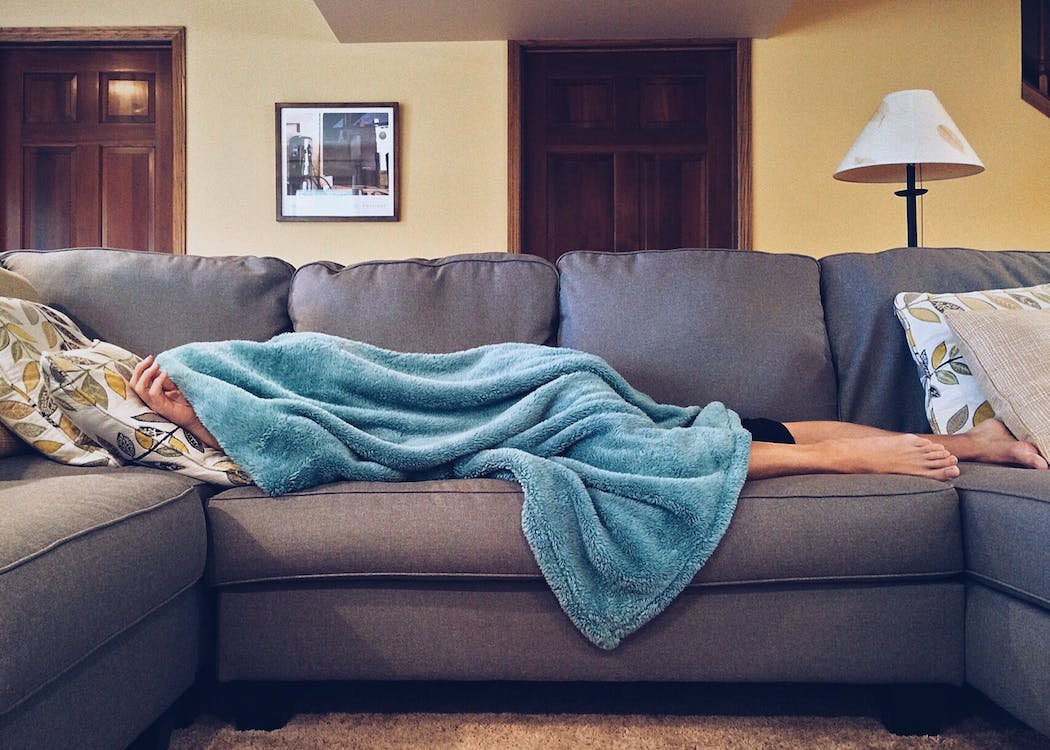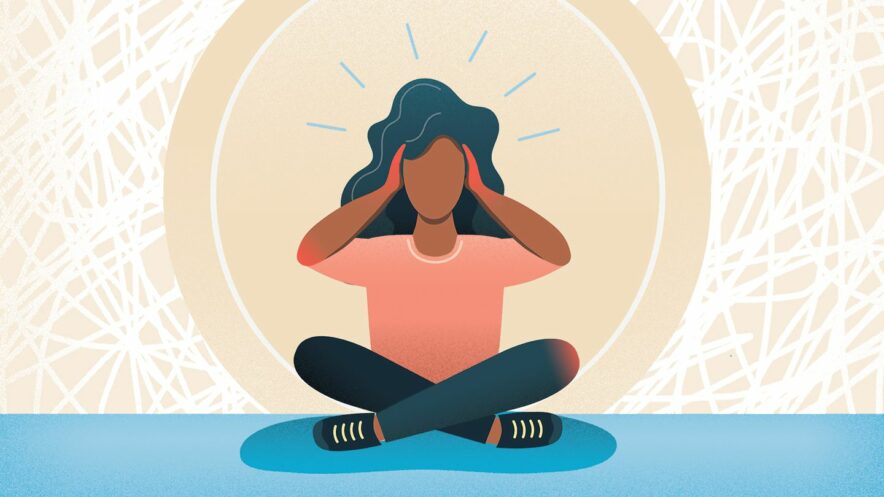Life can sometimes feel like a heavy blanket of sadness or worry, making every day a bit harder to get through. That’s where my guide comes in, aiming to lift that blanket and bring back the light.
If you’re struggling with feelings of depression or anxiety, you’re not alone, and there’s hope. I’ve been there, feeling like I was stuck in a never-ending loop of gloom and nervousness.
But I discovered ways to fight back and find joy again. This guide is a collection of simple, practical steps that helped me, and I believe they can help you, too.
Whether it’s finding peace in the chaos or rediscovering laughter, let’s take this journey together, one step at a time.
About Depression & Anxiety
Depression and anxiety are like two sides of the same coin, making us feel stuck in a loop of endless worry and deep sadness.
Imagine anxiety as that constant buzz of worry in the back of your mind, making you fear the worst in every situation. And depression?
It’s like a heavy fog that dims the colors of life, making it hard to find joy or motivation in things that used to make us happy.
But even though they’re tough, they’re also really common feelings that many of us experience. The good news is that there are ways to deal with them.
By understanding more about depression and anxiety, we can start to see that they’re not invincible. They’re challenges we can learn to manage so we can find our way back to feeling brighter and more secure.
Guide To Get Rid Of Depression And Anxiety 2024: 12 Ways
1. Sleep is Essential for Recharging:
Just like a smartphone that needs to be charged, your body requires sufficient sleep to function optimally. Operating on minimal sleep is akin to using your phone when it’s almost dead—it’s inefficient and frustrating.
Source: Pexels
Ensuring a good night’s sleep acts as a recharge for your brain, equipping you to tackle daily challenges more effectively. Establishing a calming bedtime routine can significantly enhance the quality of your sleep.
This could include activities that relax the mind and body, preparing you for a restorative night’s rest.
This practice is vital for maintaining mental and physical health, as it supports cognitive functions, mood regulation, and overall well-being.
2. Nutritious Eating for a Better Feeling:
Think of your body as a vehicle, with food serving as its fuel. Just as the right fuel is crucial for a car’s performance, consuming nutritious foods is essential for your body and mind’s optimal functioning.
Source: Pexels
Eating a diet rich in fruits, vegetables, and whole grains can improve your physical and mental health.
These foods provide the necessary nutrients that act as premium fuel, enhancing your energy levels, cognitive function, and mood.
By choosing wholesome foods over processed ones, you’re investing in your body’s long-term health and well-being, ensuring that it runs smoothly and efficiently.
3. Physical Activity Reduces Anxiety:
Engaging in physical activity triggers the release of endorphins, the body’s natural mood lifters. This effect is similar to the sense of accomplishment and clarity one feels after tidying up a cluttered space.
Source: Pexels
Regular exercise, even in small doses like dancing in your room or taking brief walks, can significantly improve mental clarity and reduce stress levels.
Incorporating movement into your daily routine doesn’t require intense or prolonged workouts; simple activities that you enjoy can have profound benefits on your mental health, helping to clear your mind and alleviate worries.
4. Establishing a Routine for Reduced Stress:
A well-structured routine can make life seem more manageable and less chaotic.
Source: Pexels
Knowing what your week looks like in advance can minimize stress and anxiety, as it removes the uncertainty of what comes next.
Setting specific times for eating, working, and relaxing can streamline your day, making tasks seem more manageable.
This consistency helps in reducing anxiety and contributes to a smoother, more predictable daily experience. Establishing a routine is akin to laying out a map for your day-to-day activities, providing a sense of control and stability.
5. Pursuing Passions for Mental Well-being:
Engaging in activities that you love can have a profound effect on your mental health.
These activities, whether they be painting, reading, or any hobby that brings you joy, act as a form of mental escape, allowing you to lose track of time and forget your worries.
Source: Pexels
Allocating time for such passions is crucial, as they provide your mind with a ‘mini-vacation,’ offering a refreshing break from the stressors of daily life.
This not only rejuvenates your spirit but also contributes to overall happiness and fulfillment.
6. Identifying Stress Triggers for Better Management:
Understanding what causes your stress or anxiety is crucial for effective management. It’s akin to foreseeing a storm and preparing or seeking shelter before it arrives.
Source: Pexels
By identifying your stressors, you can devise strategies to cope with or avoid them, thereby reducing your overall anxiety levels.
This proactive approach allows for better mental health management and equips you with the tools to guide challenges more smoothly.
7. The Importance of Social Connections:
Communicating with friends and family about your feelings can provide significant relief. Sharing your problems often makes them seem less daunting, similar to how a shared burden feels lighter.
Source: Pexels
Engaging with a community, whether in person or online, encourages a sense of belonging and support, making challenges more manageable and reducing feelings of isolation.
8. The Mood-Boosting Effects of Sunlight:
Exposure to natural sunlight can enhance your mood, much like how a sunny day can lift your spirits.
Source: Pexels
Making an effort to spend time outdoors or near a source of natural light each day can have a positive impact on your mental health, providing Vitamin D and improving your overall mood.
9. The Joy and Comfort of Having a Pet:
Having a pet can make you very happy. Pets, like dogs or cats, give you friendship that is easy and true. They are always there for you to listen to and play.
Source: Pexels
Taking care of a pet means you have a daily schedule, which can make you feel good because you’re helping them live a happy life. Being with a pet can make you feel less lonely and more cheerful because they love you no matter what.
They also get you moving, like when you take them for walks, which is good for your health. Pets can even help you meet and talk to new people during walks or at the vet.
10. Hydration for Mental Clarity:
Keeping hydrated is like oil for a machine; it’s essential for your body to function well. Drinking enough water keeps you alert, preventing that sluggish feeling that comes from dehydration.
Source: Pexels
This boost in alertness improves your ability to think and focus. Imagine trying to work or study when you’re really thirsty—it’s tough, right?
That’s because your brain needs water just like the rest of your body does. By making sure you drink water throughout the day, you’re helping your brain stay on its A-game, making tasks easier and helping you concentrate better.
11. Positive Thinking for a Happier Life:
Thinking positively can really change how you view life. It’s like putting on a pair of glasses that make everything look brighter and better.
By focusing on what’s good in your life and being thankful for it, you start to feel happier and more content. It’s not about ignoring problems but choosing to see the good amidst challenges.
Source: Pexels
This positive outlook can make you feel more hopeful and satisfied with your life. Like any habit, the more you practice seeing the good, the easier it becomes, leading to a happier and more fulfilling life.
12. Engaging with NGOs or Community Programs:
Getting involved with non-governmental organizations (NGOs) or community programs can add a lot of value to your life. These groups work on various projects that help people, animals, and the environment.
Source: Pexels
By volunteering or participating in their activities, you not only contribute to making a difference but also enrich your own life.
This involvement can help you learn new skills, meet people who care about similar issues, and feel more connected to your community.
It’s a way to give back while gaining a sense of fulfillment and purpose. Plus, being part of something bigger than yourself can boost your happiness and give you a fresh perspective on life.
These strategies offer a broad framework for improving mental well-being, but it’s important to remember that everyone’s needs and preferences are unique. Experimenting to find the most effective practices for your personal journey is key to achieving a balanced and fulfilling life.
Improve Your Sleep & Depression, And Anxiety
Over a third of people worldwide have trouble sleeping, known as insomnia. Research shows that not sleeping well can make life harder and lead to feelings of depression.
It’s like a two-way street: feeling down can make it hard to sleep, and not sleeping can make you feel worse. To help with mood swings, anxiety, and depression, it’s really important to work on sleeping better.
Instead of turning to sleeping pills, try therapies like cognitive therapy or dialectical behavior therapy to improve your sleep.
But first, it’s a good idea to talk to a doctor or therapist. They can check for any health issues or worries causing your trouble sleeping.
To get better sleep, try turning off all gadgets by 9 p.m. and reading a book you like for about 30 minutes. These simple steps can make a big difference in how well you sleep.
FAQs
Depression is a mood disorder that causes a persistent feeling of sadness and loss of interest. It affects how you feel, think, and handle daily activities.
Anxiety is a normal and often healthy emotion. However, when a person regularly feels disproportionate levels of anxiety, it might become a medical disorder. Anxiety disorders form a category of mental health diagnoses that lead to excessive nervousness, fear, apprehension, and worry.
Yes, both children and teenagers can experience depression and anxiety. Their symptoms might be different from adults, making it important to pay attention to changes in their behavior and mood.
Several factors can cause these conditions, including genetics, brain chemistry, personality, and life events. It's often a combination of factors that leads to depression and anxiety.
Yes, depression and anxiety are common across the globe, affecting millions of people of all ages and backgrounds. Awareness and understanding of these conditions are growing, leading to better support and treatment options worldwide. 🤔 What is depression?
😰 What is anxiety?
👥 Can children and teenagers have depression and anxiety?
🌱 What causes depression and anxiety?
🌍 Are depression and anxiety common worldwide?
Quick Links
- Best Inspiring Motivational Speakers
- Ultra Manifestation Review
- Manifestation Miracle Review: Is It Worth The HYPE?
- Subconscious vs Unconscious Mind: The Powerful One?
- How to Clear Your Mind of Unwanted Thoughts
- How to Find Peace of Mind
- Havening Techniques To Reduce Stress By Paul McKenna
- Useful & Easy Steps To Improve Concentration
Conclusion: Get Rid Of Depression And Anxiety In 2024
Depression and anxiety are common but serious issues that can deeply affect a person’s life. They both cause emotional distress and can make everyday tasks seem hard.
However, the good news is that both can be managed with the right help. This might include talking to a doctor, therapy, medication, or simple changes in lifestyle like exercising and eating well.
It’s important for anyone suffering to know they’re not alone and that help is available. Understanding, support from loved ones, and professional guidance can make a big difference.
It’s okay to reach out for help, and taking that first step towards getting better is a brave and important move. Remember, everyone deserves to feel good and live a happy life.

















